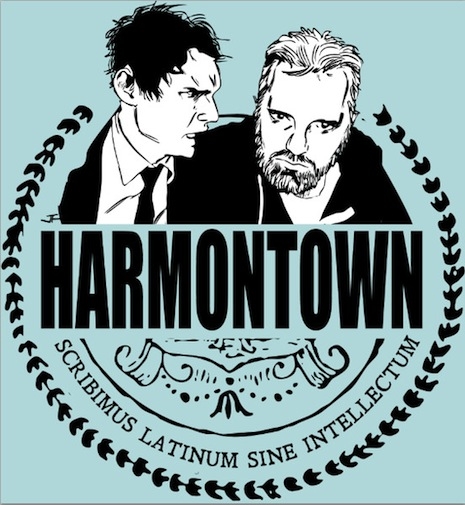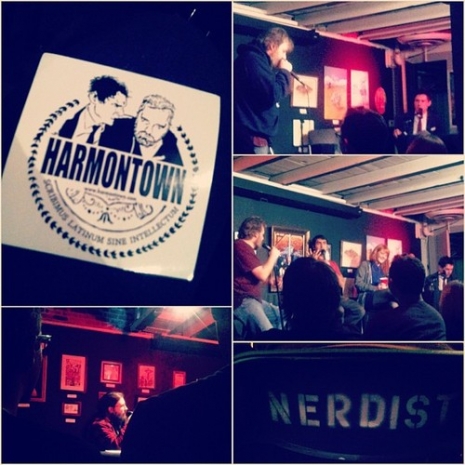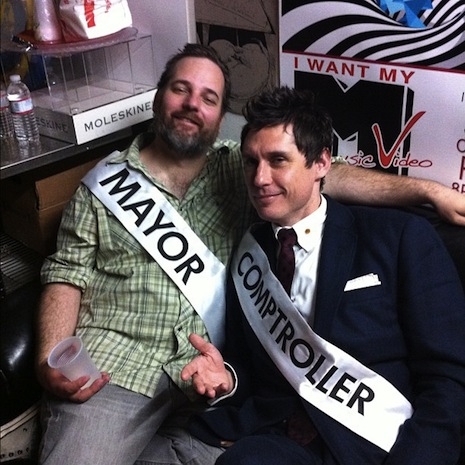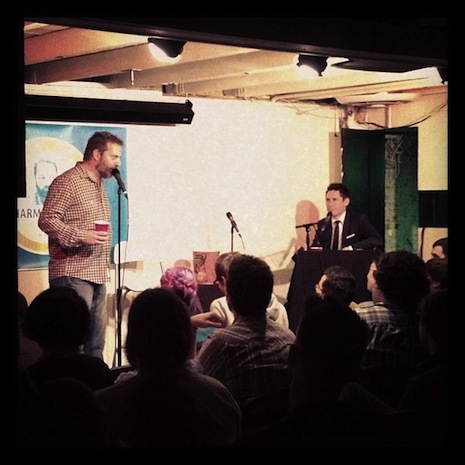
To get a handle on who Dan Harmon is, the following facts are relevant. He grew up in Wisconsin, which gave him access to, simultaneously, a healthy dose of anti-elitism, a taste for brusque humor, and an enduring respect for hard work. As a child growing up, he had the early verbal gifts and a doting mother and a psychologically absent father; the household was an untidy one. In his teen years (to place him generationally, Harmon turned 40 recently) he feasted on the dork’s trinity of comics, sci-fi, and D&D. He’s probably on “the Spectrum” but had the wit and/or the guts to try improv at his early adulthood (before it was trendy, too); the improv seems to have taught him to be fearless—for what is there to fear in experimentation and self-revelation?—and gave his writerly, Spectrum-y brain an extrovert’s outlet. He may have had that performative spark all along, but the improv instilled habits that would prove very, very useful and make him, almost incidentally, rather wealthy. In any case he’s a writer’s writer with just enough sketch chops to pass as a real performer, and this sets him apart. He’s imbibed the performative instinct; onstage, he inhabits “bits.” The improv probably saved him from becoming an inveterate crafter of dreary and well-written novels, and thank god for that.
Even though he has a formal education he qualifies as an autodidact, the telltale sign of which is his wholesale adoption of Joseph Campbell as his hero. He has the necessary verbal gifts and fearlessness to be a writer (which he is)—one wonders if he ever really reads books; books never enter into his stories, and this is a guy who shares everything. But then again, his job is TV, and what he “reads” is pop culture most of all—for pop culture tropes are what an improv artist most requires, and the same is true for the creator and showrunner of Community.
Everyone who writes about him mentions his intelligence, and I’m no exception. He’s given to frenzied, flustered, and eloquent rants, he sometimes bullies his interlocutors in argument (he admits as much), and the scalpel of his highly intuitive intellect occasionally runs ashore on the shoals of insufficient command of fact and, very occasionally, of common sense. But that’s fine, I like messy and bold thinkers, and Harmon is nothing if not that.

Harmon’s the only guy I can think of who can feature as an authoritarian and a Trotskyite in the same breath. In a recent episode of Harmontown, he argued with his co-presenters for many minutes about the agrarian worker’s paradise of perhaps a hundred people he would set up on the moon, given the opportunity. In effect he was bellowing, “No no no, I’m decreeing that there won’t be any hierarchy here!!”—and he was scarcely aware of the contradiction. What was truly transmitted in the whole debate was his honest and devout desire for such a world.
His penchant for abject self-revelation functions like an onion onstage, there are always more layers. His very sharp and ostentatiously “needy” (note the quotation marks) girlfriend Erin McGathy, who has a podcast about relationships of her own called This Feels Terrible is also a weekly presence on Harmontown, and on several occasions the two of them have engaged in ostensibly gut-wrenching arguments onstage that left audience members gaping (the Pittsburgh episode of their tour last winter was a standout in this regard). But when the metaphorical curtain drops, they all take their metaphorical bows, and it emerges that in some sense these battles function as still more “bits.” But underneath those “bits” are, it seems, real pain at times, and so on indefinitely. The improv performer’s ethic allows them to pass off their actual emotional tumult as entertainment, but one is left wondering just how protected they really are. Apparently they’re all “strong” enough in the right ways to deal with it, or else simply crave that which an audience alone can supply them. It wouldn’t be unfair in this context to observe that Harmon, with his messianic fervor, does hanker after the Christlike. In some indefinable way he crucifies himself every week (some weeks) in order to confer beneficent lessons onto his Asberger’s-y flock.
Unmentioned so far is a key part of the dynamic—Dan Harmon is the mayor of Harmontown, but the always nattily dressed Jeff Davis, an authentic improv actor often seen on Whose Line Is It Anyway?, serves as its comptroller. Harmon and Davis, who are dear friends in real life (it would have to be so in order to work), are something like the Ernie and Bert of grown-up verbal horseplay, but that metaphor misses the dapperness and bon esprit and general air of specialness Davis involuntarily imparts, and the analogy of Cameron and Ferris misses it on the other side; Harmon’s too self-actualized for Cameron (even if he has the angst).

I “discovered” Harmon as an object of interest of his own (as distinct from Community) last year, and I’ve been calling him “the thinking person’s Bill Murray” ever since. The trouble is, I’m not sure what that gets him. There’s a real chance he could emerge as something like this generation’s—what? Andy Kaufman? No. George Plimpton? Also no. (John Hodgman is that.) Hunter S. Thompson may be the closest we can get, the intellectual’s daredevil icon. The fact is that we haven’t seen a gregarious intellect-but-not-intellectual like this in the public sphere in living memory. It just isn’t usual for people as smart and greedily cerebral as Harmon to have enough common touch to become even remotely famous. All the good comps are literary writers (David Foster Wallace? Truman Capote?), and Harmon isn’t that.
While showrunning Harmontown, Harmon first took serious notice of the Spectrum, and he has become something like the Spectrum-inhabitant’s especial hero par excellence. The tribe that has coalesced around Harmontown meets in the back of a comic book store in Hollywood, and Harmon frequently references the likelihood of a Harmontown fan to be, variously, male, bearded, shy, obsessively honest, able to cite Star Wars: A New Hope chapter and verse, and so on. We all know the type (hell, I’m one too, albeit not so strong on the Lucas interest). I attended his triumphant return from “HarmonCountry” at the Egyptian Theater last February, and the line awaiting the passes at the entry table certainly confirmed any stereotypes one might have harbored about his audience.
All of this is to say that Harmontown is the best comedy podcast currently being distributed, period. Harmon has a talent for spawning projects, and Harmontown appears to be #2 on his docket at the moment (he is running Community again, after all). The number of tweets and photos and videos and paintings he and his audience have generated is positively daunting; Harmontown is a cult of sorts. Harmon is reflexively technophilic, and both he and his audience are entirely comfortable in what used to be called cyberspace.
What else do you have to know about the show? True to its democratic intentions, audience participation is a usual thing; Harmon and Davis are as likely to haul up an audience member onstage as anything else, and a fair number of the audience members are known as semi-regulars. I attended three episodes when I was visiting LA last February, and what do you know, Harmon ended one of the episodes by pulling me into the action; he actually sang me a little song in which he professed to love me as a symbol of his love for all humanity (go to the 98:00 mark).
Harmontown started out as an hour-long show but rapidly ratcheted up to roughly two hours a week. A D&D game has been in effect since the early weeks; Harmon recruited a marvelous fellow named Spencer Crittenden from the audience one night to serve as dungeonmaster, a decision that has reaped rewards wildly beyond anyone’s expectations (Crittenden now works as Harmon’s assistant on the set of Community). The D&D game takes up about a third of every episode, and the in-game characters are by now as familiar to the audience as Harmon, Davis, et al. themselves. Harmon’s character is Sharpie Buttsalot for amusing reasons revealed in episode 6; Davis is for arbitrary reasons known as Quark Pffffffffft; and so on.

After a few months of the podcast, Harmon took the whole clan on the road for several weeks in order to meet his audience outside of LA; these segments are collectively known as “HarmonCountry.” The road episodes are wildly entertaining (each one is also obscurely sui generis), and they also served to cement his relationship (hitherto a presumptive one) to his audience in interesting ways. Harmon being Harmon, there was no lack of grandiosity in it all, but his essential good nature and good intentions keep shining through. A documentary about the tour is currently in the process of being edited.
In a landscape in which even very sharp podcasts have a thudding air of dude-ness about them, Harmontown is an oasis for that rarest of things—wit, even Wildean wit in the purest sense. Harmontown is an arena in which what is prized above all is verbal play, and that isn’t something that is actually true of any other comedy podcast I can think of; in other podcasts, all of the comedians ultimately hew very closely to a comparatively restricted set of tropes that (let’s face it) substitutes for wit. Paul F. Tompkins might be the guy one would use to counter the above statement about Harmontown‘s wit, but Tompkins and Harmon are completely different types. Tompkins is a trained professional who is as fussy about his wardrobe as Davis himself; Harmon is a wild man by comparison, perfectly willing to play a gorilla in the wild for an hour a week, wading into inchoate territory that would leave Tompkins feeling more than a little exposed. What makes Harmontown special is that they nail the wit thing again and again even under such unpromising, i.e. primal conditions.
The truly revolutionary aspect of the show is that it is truly, truly unscripted. Many episodes start with a (completely sincere) avowal from Harmon that he hasn’t any idea if there’s anything to talk about this week, and damned if every week they don’t come up with a fruitful tangent to follow. The shared history of Harmon and Davis (and satellite characters like his sometime writing and business partner, Rob Schrab) enables this, because there’s no shortage of crazy anecdotes to dredge up, for Harmon and his friends live to be casually, playfully brutal to one another as only good friends can, a stance one finds oneself envying—we return to Harmontown’s missionary aspect. The show derives its energy from the sheer confidence Harmon has in himself to be interesting, and you can feel the other participants’ confidence in the exact same thing. As long as Harmon has a burr up his butt about something, the show will be dazzlingly entertaining, period.
It’s smart and fun and evinces a real sense of community. You never know what to expect from an episode of Harmontown, and there’s a subreddit dedicated to sifting through the ashes every week. Harmon and his buddies really know pop culture, and they have a perspective (more than one perspective), and a lot of shared in-references, and, I don’t know, if you’re a verbal type, it generates an oxytocin hit in the brain that no other podcast can touch.
Here’s some video! Harmontown is a podcast, hence there isn’t video of it. Instead, here’s Harmon in an extended interview with Kevin Pollak from the summer of 2012 and a weird training video Harmon performed in for Cousins Subs chain in 1995.
Previously on Dangerous Minds:
The Bugle is the goddamn funniest satirical podcast you’ll ever hear
Dangerous Finds: Hostage-taking pit bull; Douglas Rushkoff on Marc Maron podcast, Daft Punk unmasked